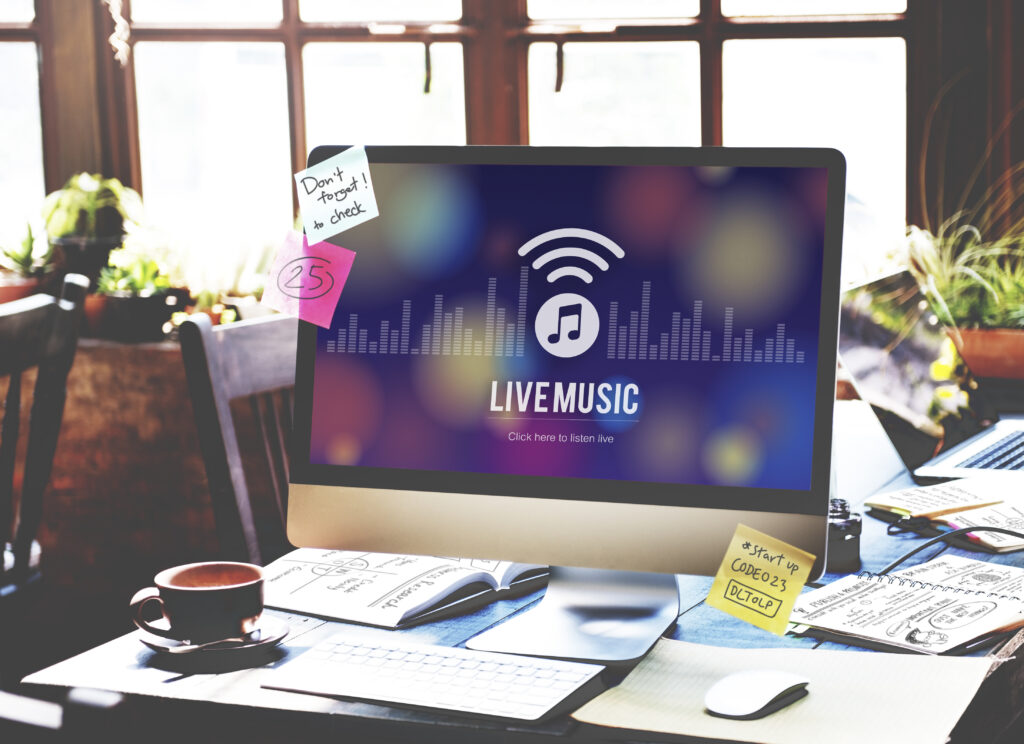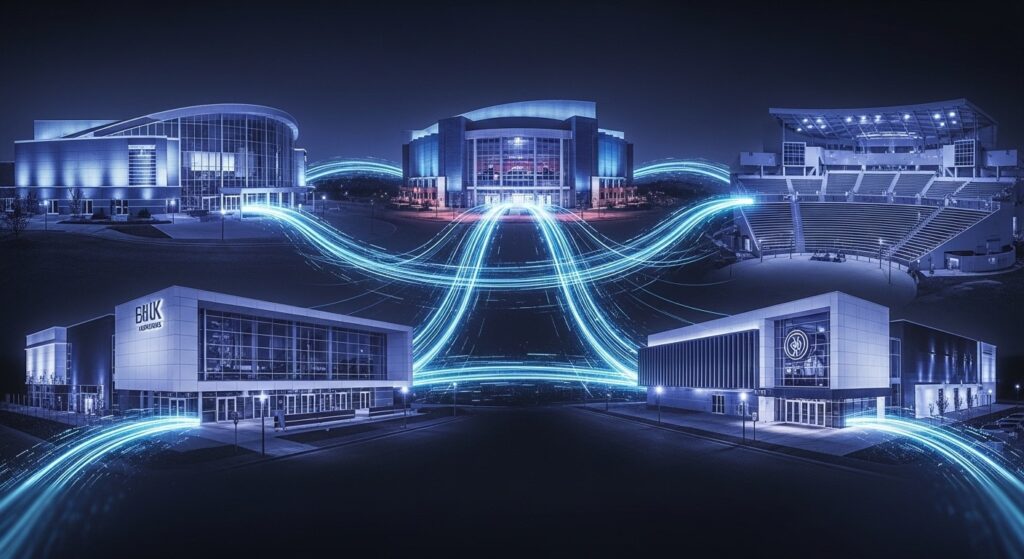
The Best Music Marketing Tools for Promoting and Selling Out Shows
Successful promoters utilize a range of marketing tools to maximize a concert’s potential. The right instruments let promoters stay in tune with the audience, seize opportunities, and ultimately sell out more shows. Just as important as the tools themselves, being able to adjust strategies to stay ahead is a hallmark of the best music promoters. With some flexibility, event organizers can take advantage of today’s music marketing tools to help a venue flourish.
Beyond choosing the right tools, it’s just as critical to utilize data to get the most out of your marketing toolkit. Without effective data tracking, you won’t be able to adjust in real-time to the changes in the marketplace. A strong data infrastructure unlocks value across the board, allowing a promoter to match the tool to the event in ways that were previously impossible.
Here are some of the best tools available today for concert promoters, and how to use them to maximize the impact of every event.
Social media remains one of the best music marketing tools
Social media remains one of the top picks for marketing in the music business, but what are the best ways to utilize it? Step one is finding the best outlet for your band or event. Facebook remains a powerful marketing tool, although other platforms might be a better fit depending on your target audience. For up-and-coming bands, TikTok is hard to top, but promoters have success on Instagram and Snapchat as well.
In a similar space, YouTube videos can also help you get the word out about a band and highlight what a fan will experience at a show. Prior performances, backstage access, and other fan-friendly materials can help generate buzz for a show or artist. With more than 2.6 billion active users worldwide, YouTube is an essential platform for reaching new audiences. There’s even YouTube for Artists, which is filled with tools geared to music professionals promoting talent. Top promoters learn the available social channels from the perspective of both artists and fans, helping them create the right plans to promote their events.
SMS Messaging can be an overlooked gem
Social media gives promoters a dynamic option that lets them run wild with creativity. On the other side of the spectrum, SMS text messaging is more creatively limited but undeniably effective. SMS messaging is the number one method of receiving brand updates, with 48% of consumers ranking it first among a spread of digital options. Although it’s a popular method for marketers across the board, studies show that it’s especially effective within the entertainment industry.
Related: Tips For Creating The Essential Concert Promoter Business Plan
Marketers know they have a captive audience that doesn’t need to be converted. For concert promoters, it helps to remember that an SMS audience is already interested in the band and wants basic and useful information. Event organizers have the most success when they get to the point with an upbeat tone and direct the audience to take the next steps. A successful SMS campaign that invigorates proven fans can be a great way to get an early spike in sales and ultimately sell out more shows.
It’s also a great opportunity to tell fans about merch offerings, food and beverage discounts, flash sales, and more. Promoters can increase attendance (and boost profits) simply by sending out critical information and reminders to the biggest fans.
Email campaigns can still be very effective
Emails take the same captive audience as SMS messaging and give promoters innumerable ways to generate excitement. It’s also important to get to the point here, but organizers can use the expanded canvas to provide a wealth of details that fans will be interested in. VIP access announcements, footage from recent events, and more can be highlighted in an email as a promoter hopes to drum up enthusiasm. The result of a successful campaign is high engagement that can be leveraged directly into ticket sales.
Organizers can also go well beyond the basics. Using list articles (listicles) and other timely content can build credibility in between events, priming the audience for making a purchase when a new concert is announced. Even if they’re a little on the old-school side compared to other music marketing tools, email campaigns are easy for audiences to absorb and can yield terrific results.
Pro tip: You can enhance a campaign’s effectiveness by linking up with local organizations that have overlapping audiences. And if you’re not sure how to build an email campaign from scratch, there are great tools (e.g., MailChimp, Constant Contact) that will help you put together a strong campaign.
Effectively using digital advertising
It’s easy to throw money at advertising platforms, but promoters need a refined approach to get the most out of digital ads. Before committing any funds, it’s a good idea to shop around and learn the basics. You might even want to ask your network of industry contacts to see what works and what doesn’t; this can save you time and headaches as you implement a digital-ad strategy.
The two biggest advertisers on the planet, of course, are Facebook and Google. The main difference between the two is that Facebook hones in on demographics while Google relies on keywords to direct traffic. Facebook is excellent for a host of different music-related objectives, from driving merch sales and expanding live streaming to promoting a major concert event. The Facebook ads manager makes it easy to begin a campaign and to track its success, which is essential to figuring out your longer term strategy.
Related: How To Capitalize On The Rise Of Co-Promotion In Live Music
Tracking is also a fundamental part of Google Ads, which gives you a similar level of control. One of the nice features for a budget-restrained promoter is that you don’t pay a cent unless someone actually clicks on your ad (if you use the pay-per-click option). That’s why Google Ads can be a terrific way to start a digital ad campaign for smaller or midsized operations.
Local collaborations can be a game changer
Promoters need to have a keen understanding of who is influencing the local entertainment scene. Collaborating with an ascending local talent can be an excellent way to tap into enthusiasm that can translate to sold-out shows. Many event organizers also work with other local influencers (e.g., local radio personalities) who can help steer a built-in audience toward their events. The right local partnership can provide a bump in followers without a robust financial investment.
The question is how to find the right collaborations. This is where a concert promoter must do their homework and find a way to showcase their value to influencers. Going to open mic nights, jam sessions, and festivals can give you a sense of who has sway within the local entertainment scene. You can also see what the audience is looking for and how you might be able to tap into their interests.
By understanding an artist or influencer’s audience, a promoter can make a compelling case for a collaboration that will be mutually beneficial. After all, the goal is to create a lasting collaboration that goes beyond a single event. If successful, a promoter will have the inside track to new audiences while gaining a valuable partner.
Benefitting from established ticketing platforms
Your go-to audience is amped and everything seems to be aligning for the big show. Now you need an easy way to turn interest directly into ticket sales. While many venues have their own ticketing methods, tapping the built-in infrastructure of a platform like Ticketmaster or Eventbrite can help turn a modest success into a sellout. Such platforms offer simplicity that is perfectly catered to an audience used to making purchases on their phones. They also enhance your visibility and can help you reach fans not on your radar.
This digital infrastructure can be a boon for a venue operator who doesn’t have the time – or budget – to prioritize the mobile experience on their website. Nearly 80% of consumers make purchases on their phones, a trend that is likely even more pronounced for younger buyers. If you’ve successfully spread the word about a big show, the last thing you want is for a fan to struggle to make the purchase. Letting a ticketing outlet handle part of the sales process can be instrumental in selling out more shows and converting fanfare into revenue.
Spotify can be an easy way to promote events
When it comes to connecting fans directly to the music you’re promoting, Spotify is a first-rate option. Spotify for Artists consistently ranks as one of the best music marketing tools, as it’s built to help artists of any size reach both existing and new fans. The platform is specifically designed to help give independent artists a better chance to flourish. Promoters can add exclusive playlists, post upcoming shows, and see how many fans are engaging with their profile.
But this is also where knowing the talent and the audience is critical. Spotify is a widely used platform, yet many bands get more traction with other music-sharing tools. Tools like Amplify facilitate the link-sharing process and let you use the best platform for your talent and venue. If one avenue isn’t working as well as it should, promoters have music marketing tools to quickly find other ways to reach their target audience.
Utilizing the full set of tools to sell out more shows
Today’s live music scene is all about using what’s available and adjusting to new market conditions. It’s essential to find the tools that best fit your operation, but it’s just as critical to track performance and recalibrate as necessary.
Promoters who regularly incorporate data into their strategies will have an inside track on generating buzz, converting interest into ticket sales, and improving revenue through better attendance. The right music marketing tools will guide you through the process while letting you execute customized plans that match the scope of your events.
As you assemble your promotional tools, Prism’s platform gives you the boost of efficiency needed to maintain a competitive edge. Prism’s user-friendly portal makes it easy to synchronize your event plan and make sure all team members have the real-time information they need to succeed. Get started today to find out how Prism’s industry-specific live music platform can streamline your operation and let you spend more time developing your promotional tactics.

Matt Ford is the founder and CEO of Prism.fm, an Austin-based software company revolutionizing live music event management. With a background in entrepreneurship and a degree from the University of Wisconsin-Madison School of Business, Ford combined his self-taught coding skills with firsthand experience as a concert promoter to address the inefficiencies he observed in the industry. In 2018, he launched Prism.fm, an all-in-one platform designed to streamline operations for venues, promoters, and agencies by replacing cumbersome spreadsheets with integrated tools for booking, financial tracking, and contract management. Under his leadership, Prism.fm has grown significantly, achieving $3 million in annual recurring revenue post-COVID and securing over $15 million in funding . Ford’s commitment to building user-centric solutions has positioned Prism.fm as a trusted partner for over 1,500 venues and promoters worldwide.



